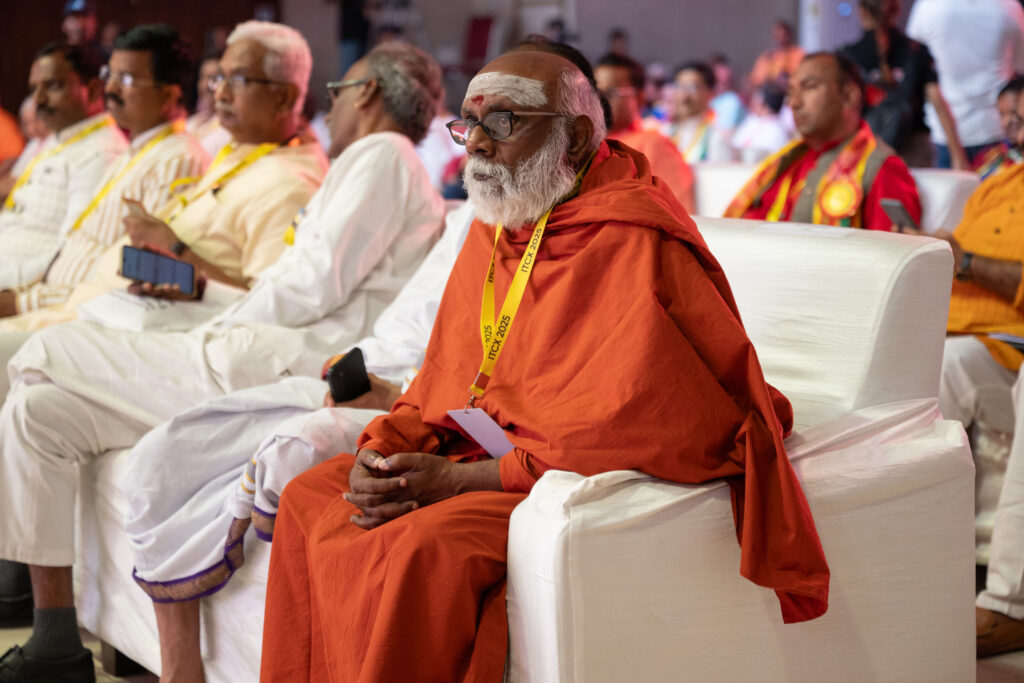TIRUPATI, ANDHRA PRADESH, Tuesday, 19 February, 2025:
Renowned political leaders and temple heads came forward to support the dilution of government control of temples, aligning with the vision laid out by CM of Andhra N Chandrababu Naidu at the International Temples Convention & Expo (ITCX) 2025, being held from Feb 17-19 at Asha Conventions, Tirupati.
The second day of the ITCX 2025 witnessed a powerful call for the protection and empowerment of Sanatan Dharma, as Tamil Nadu BJP State President K. Annamalai and VHP General Secretary General Milind Parande reinforced Andhra Pradesh Chief Minister Chandrababu Naidu’s vision of temple-led economic transformation with India’s technological and spiritual resurgence.
The day’s proceedings also brought together technology experts, temple administrators, and spiritual leaders to explore the intersection of ancient wisdom and modern innovation. Notable sessions focused on leveraging artificial intelligence for crowd management, implementing digital payment solutions, and enhancing security systems while preserving traditional practices.
In his keynote address at ITCX 2025 in Tirupati, Shri K Annamalai ji, State President – BJP, Tamil Nadu said, “When Lord Venkateshwara gives us the opportunity for the NDA to come to power, we want to remove the illegal Hindu Religious and Charitable Endowments Acts (HR & CE) and free all the 44,121 temples. Imagine the kind of temple economy and money we will generate, helping the schools around the temples run, taking care of the civic infrastructure of a particular city, running engineering schools, and also running the centres for excellence for science. It can generate substantial revenue.” He also went into the history of Dharamanomics, underlining the meticulous and complex economic planning that Chola kings executed. Referring to that, he called out, “These temples can not only be centres for Dharma but also a bridge between the privileged and the underprivileged. Temples are uniting Bharat, reviving the spiritual fraternity that is essential for the sustenance of Sanatana Dharma.”
Shri Milind Parande Ji, General secretary, Vishva Hindu Parishad strongly mentioned that ‘Hindu Samaj is capable of taking care of its temples.’ “Our idea is not to take the temples from one system and put them in another. The autonomy of all temples will be respected, bureaucracy will be left out and broader representation of women and ST, SC will be ensured. The Shree Ram Janmabhooomi Andololan, under which programmes were conducted in over 90 countries and supporters visited 5,32,000 villages in Bharat, was an inspiration.” He said that the apex body in the state Rajya Dharmik Parishad would be created for facilitating, promoting, coordinating, and regulating the Hindu temples and Charitable endowments in the state. “Rajya Dharmik Parishad will be composed of religious leaders, scholars in areas including sampradayik and dharmic practices, agamas, philosophy, retired judges, civil servants, business and industry people, ST, SC, tribes and women. The members may include the CM, leader of Opposition, and Chief justice of state. Every two years, one third of the committee will retire for transparency. There will be transparency in accounts, to ensure Hindu money is spent on Hindu causes and service of the needy in Hindu society. It will ensure temple properties are preserved, adequately safeguard rights and enrolments of archaks and sevaks with provision for their education and training. Non-hindu employment in temples will be corrected and minimum wages for temple workers will be set.”
Shri La Sri Narayana Desika Swamigal, the 14th pontiff of Kovilur Mutt, discussed the community’s significant contributions to temple restoration, their influence on India’s financial landscape, and the need for government reforms to support temple charity. “I am very happy to inform you that our delegation, consisting of roughly 100 temples, managed, constructed, and reconstructed by the community, is the largest group of delegates at this conference. Despite our relatively small number of 150,000 people, the community has restored 120 of the 234 temples sung by the great Nayanmars”, he proudly shared.
The convergence of tradition and innovation was further reinforced by distinguished Southern leader Shri So So Meenakshi Sundaram, Retired IAS, who emphasized temples’ role as centers of socio-economic transformation – directly aligning with Naidu’s vision of serving both God and humanity as India’s inherited dharma.
In an interesting panel discussion, Dr Suresh Haware, Former Chairman, Saibaba Sansthan Trust Shirdi and Dr. Uday Salunkhe Ji, Director – Welingkar Institute of Management Development & Research, discussed the need for Temple Education in today’s day and age. The session was moderated by Shri Giresh Vasudev Kulkarni, founder of Temple Connect and ITCX. Haware said, “Devotee satisfaction should be of utmost importance. That is because the devotee is the deity – bhakt hi bhagwan ka swaroop hai. That is why, temples must provide them with necessary spiritual experience as well as health services, medical aids, educational services. If temples provide these services to the devotees, they will be highly appreciated by society.” He also stressed upon the importance of the integration of AI, VR, face recognition and electronic surveillance in temples, alongside transparency in the donation system of the temples.
A tech-forward session saw professors from IIT Tirupati, Shri Arun Tangirala ji and Dr. Kalidas Yeturu, Dept. of Computer Science and Engineering, drawing attention to using AI for food production, preserving ancient texts and crowdsourcing expertise.
With much enthusiasm, Shri R Vidyullatha of Mysuru Chamundeswari Shaktipeeth took the audience through the history and workings of the much-revered Chamundeshwari Temple and the importance of Mysuru Navaratri. He spread further knowledge on the Dasara procession where the idol of Chamundeshwari is ceremoniously paraded through Mysuru’s streets in a Rathotsava, drawing over 4 lakh devotees.
The International Temples Convention and Expo (ITCX) is the world’s first groundbreaking platform dedicated to the comprehensive management of temples globally, fostering excellence in administration, operations, and the advancement of the temple economy. The second edition of this landmark event spearheaded by Sri Giresh Vasudev Kulkarni (Founder of Temple Connect and ITCX), and co-led by Prasad Lad (Chairman of ITCX 2025 and Member of the Maharashtra Legislative Council), is currently held in the sacred city of Tirupati.
Day 3 of ITCX will focus on temple architecture preservation, sustainable practices in temple management, and the role of temples in community development. Shri Nara Lokesh, Minister of Human Resources Development of Andhra Pradesh, who is also the son of CM of AP, Shri N Chandrababu Naidu, will also grace the last day of the convention along with other distinguished dignitaries. The closing ceremony will feature announcements of major initiatives for temple modernisation and preservation.







More Stories
Calling aspiring filmmakers to inspire social change through”Say No to Alcohol” Awareness Documentary Contest
St. Anthony’s Church, Avadi 75th Annual Feast from 10th to 15th of June 2025
பசுமை மற்றும் சுற்றுச்சூழல் பாதுகாப்பிற்காக Geo India Foundation நடத்தும் “Green Run 2025”